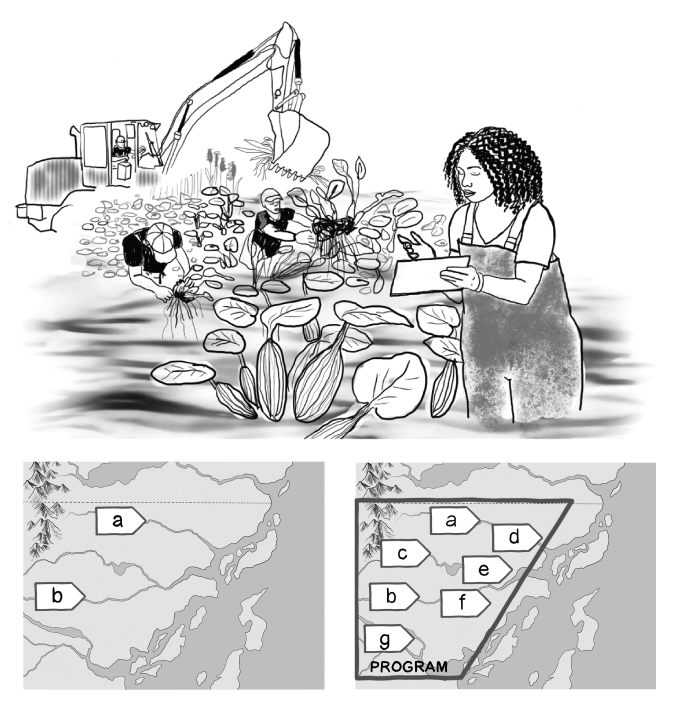
Taking Conservation to Scale: a Learning Network
The magnitude of the environmental issues we are collectively facing today means that we can no longer just focus on individual conservation projects. Climate change, biodiversity loss on a continental or ocean-wide scale, land-use change, invasive species – to combat these increasingly global issues, we need to take more effective action on a more impactful level. Because of this, the conservation community has a growing need for strategies to ‘take conservation to scale’.
The challenges of scaling
Even on the small scale, conservation always takes place in complex systems. But as we increase the scale of our issues and our ambitions, the levels of complexity increase exponentially.
When it comes to designing and executing strategies meant to affect change at this systems level, the conservation community has a mixed record, at best. Challenges include the following:
- Goals for conservation at scale are often stated as lofty, vague outcomes against which it is hard to measure success.
- When thinking about how to reach those ambitious goals, there is often a lack of understanding of the mechanisms for getting from smaller units of intervention to conservation at scale.
- Because of 1 and 2, there is lack of behavioral and social expectations on how essential it is to formulate clear goals and to apply the science of scaling.
As a result, despite the almost universal belief that conservation must occur at scale, the field of conservation does not demand it.
Tackling the challenges through a learning network
Foundation of Success (FOS) is now working with the Gordon & Betty Moore Foundation and the Walton Family Foundation to address these challenges. Together, we are creating and facilitating a learning network of partner conservation programs that are interested in developing and pilot-testing a set of strategy pathways for scaling conservation work.
Each partner program will receive tailored training and support for developing, monitoring, and sharing its scaling strategies. A grant for each partner program helps them develop their scaling goals and strategy (challenge 1) as well as take part in the broader learning network activities. Based on the experiences of the partner programs, the learning network will develop a framework for the mechanisms of scaling (challenge 2).

Example of a scaling approach. The top image illustrates a conservation project. Bottom left, the project (a) is shown in its context, where another project (b) might be working with similar issues. One mechanism for scaling is to replicate projects in programs (bottom right). Illustration by Anna Balla.
We believe this framework will help tackle challenge 3 by overcoming a fundamental barrier to effective conservation at scale. A tested and vetted framework has the potential to vastly improve the probability of success across different programs employing different types of strategies. As organizations adopt it and use it, we hope that it will shift expectations and change how conservation is done.
If successful, this learning network can help enable and catalyze conservation projects and programs to take agile, effective action at the scale needed to deal with increasingly global threats.
|
“This project is about really understanding how to pursue the scaling-up solutions in order to make them successful and about creating communities by which we collectively learn. It’s hard work, but it’s difficult to imagine scaling happening without it." Aileen Lee | Chief Program Officer, Environmental Conservation | Moore Foundation |
We expect to publish a draft framework later in 2022 – stay tuned! For more information, please contact us at info@fosonline.org.
The partner programs in the learning network
- Climate Smart Shrimp Aquaculture – Conservation International
- Illegal Killing of Birds in the Mediterranean – BirdLife International, Association Biom, EuroNatur, Vulture Conservation Foundation
- US Regenerative Row Crop Systems – The Nature Conservancy, Walton Family Foundation
- Fish Forever – Rare, Local Partners
- Network for Scaling Adaptive Management within Protected Areas Systems – WCS Peru, RedParques (Network of Government Protected Area Agencies in Latin America)
- Healthy Country Planning – Conservation Management, Network of Indigenous Peoples


